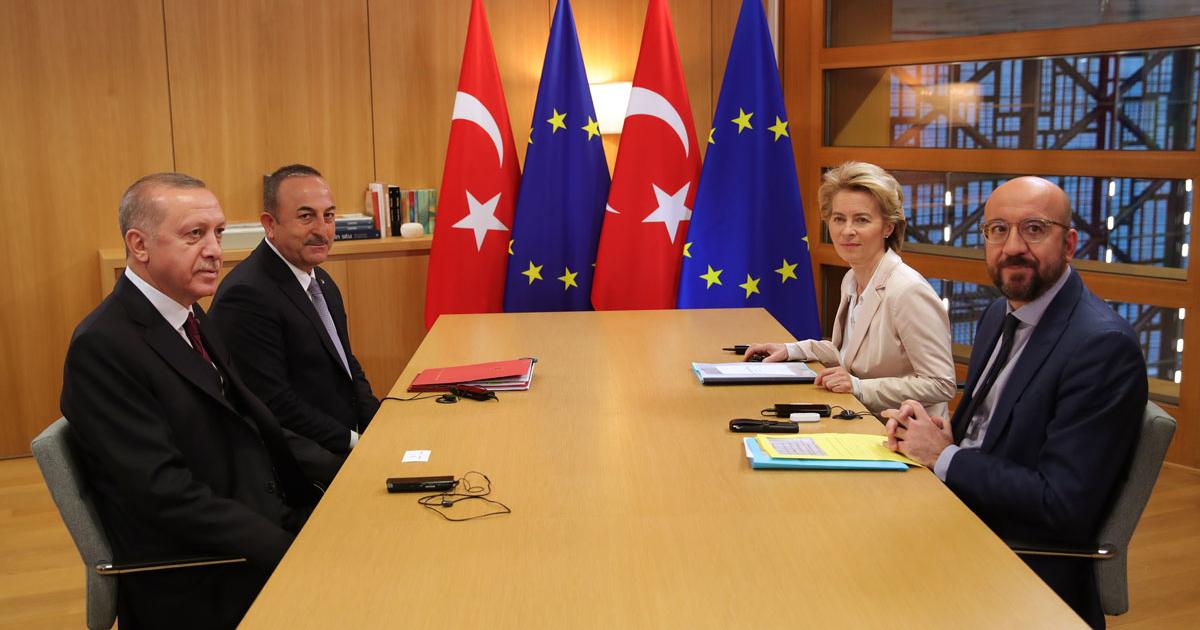Turkish President Recep Tayyip Erdogan launched his political career in 1994 as a moderate Islamist from the municipality of Istanbul supported by the then small Welfare Party of Necmettin Erbakan.
During his tenure as mayor of Istanbul he focused on the city’s daily problems – especially water supply issues, transportation, waste management, and the creation of Islamic social welfare networks.
Over time he acquired a reputation as an effective populist-religious leader.
Erdogan was opposed by systemic Kemalists and spent a few months in jail because he publicly declaimed an Islamic poem which was seen as inciting religious fanaticism.
Since then his popularity sky-rocketed and in 2001 he founded the AK Justice and Development Party which a year later won the national elections and he has dominated Turkish politics ever since.
His first years in power focused on a recovery of the Turkish economy and he systematically promoted the mass integration (mainly through Islamic networks) in the production process of marginalised segments of society.
He attempted a rapprochement with the Kurds in order to address national security problems.
The truth be told, his methods transformed Turkey into a country that grew dynamically.
He made it more demanding on the international stage but over time he was overtaken by megalomaniacal, imperialistic plans.
He had a falling out with the Kurds and slipped into authoritarianism and cronyism, until he provoked Turkey’s allies and friends and created deep divisions in Turkish society.
In order to quell domestic reactions he attempted to represent the entire Muslim world cultivating ties with Egypt’s Muslim Brotherhood of Mohamed Morsi.
He offered cover to Iranian religious leaders.
He intervened in the war in Syria to help ISIS and other anti-establishment Islamist organisations in order to rein in the Kurds there.
At the same time he tried to forge an alliance with the Shiites of the Persian Gulf in opposition to Saudi Arabia’s Wahhabism.
Erdogan’s court was rife with scandals. He gave himself a 1mn dollar monthly salary, his assets were said to be worth nearly one billion dollars, and he provoked everyone.
Then his relationship with erstwhile mentor Fetullah Gulen collapsed and a failed coup attempt against Erdogan followed in 2016.
Erdogan’s power and life were endangered and the experience led him to extreme measures such as mass-scale prosecution, firing the entire top brass of the military and especially the Air Force, and firing from the public service hundreds of thousands of civil servants, judicial functionaries, teachers, and many more categories of citizens.
To transcend the divisions that he had sowed he resorted to nationalistic rants and, adopting a stance of historical revisionism, started disputing international treaties and land and sea borders.
Erdogan benefited from the American withdrawal from the management of international affairs.
He believed he could have a decisive say in post-war Syria. He went as far as to deny the US and Nato, came closer to Putin, and started bargaining with the Europeans using as a bargaining chip refugees and migrants from various war zones.
The continual shilly-shallying, the endless bargaining, and outlandish, unilateral actions put him on a wayward path.
In Syria he was defeated – Putin does not want to him in the way – and he lost dozens of troops in Idlib.
The Americans do not trust him and only the Germans continue to tolerate him due to strong interdependencies.
Erdogan is now described as “a dark leader” who is in a psychopathological state and reacts in an odd, adventurist manner.
He faces domestic threats. He fears for his life and for the fortunes of his family, and adopts a jihadist logic with which he uses refugees and migrants to advance his claims.
For Erdogan anything goes including inciting a military clash at the Evros border region or in the Aegean islands.
He can do anything in the darkness that surrounds him but that is also his Achilles’ heel – the prospect of being destroyed by his megalomaniacal nature and abuse of the tools he believes he has at his disposal.
That means that our side must retain its calm, decisiveness, and defence until the end.
He will lose because his objectives are simply unjust.




